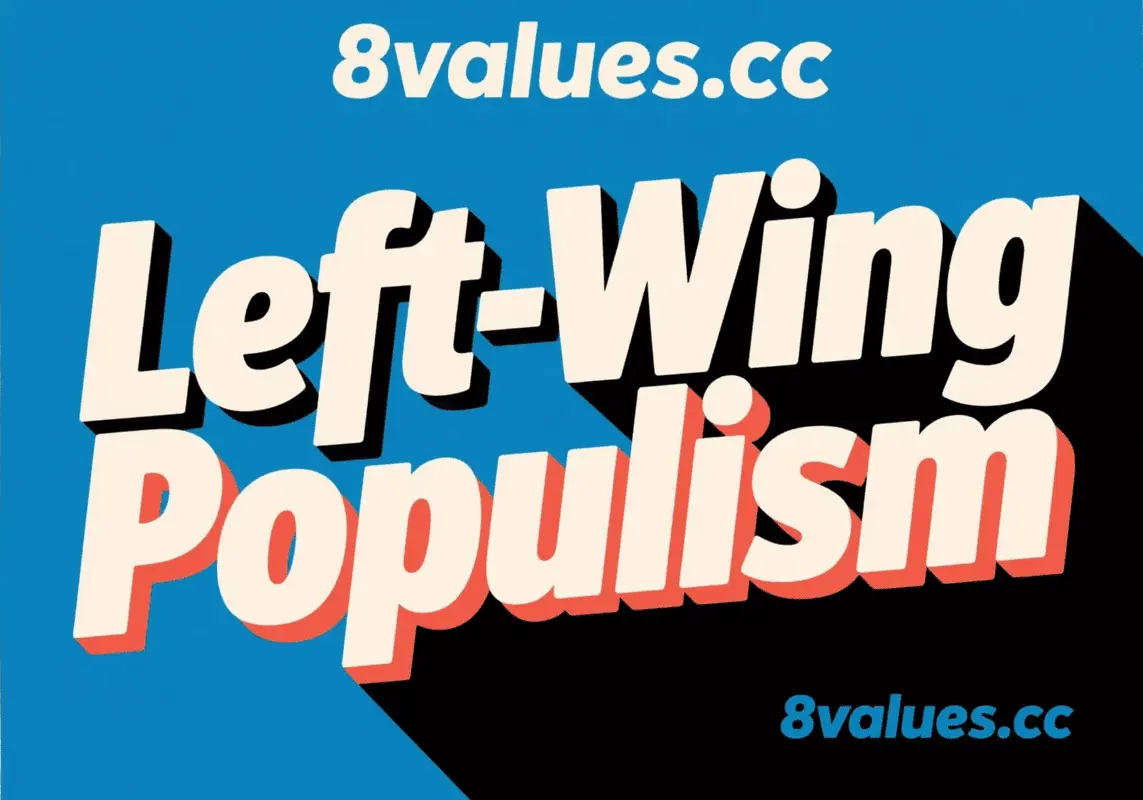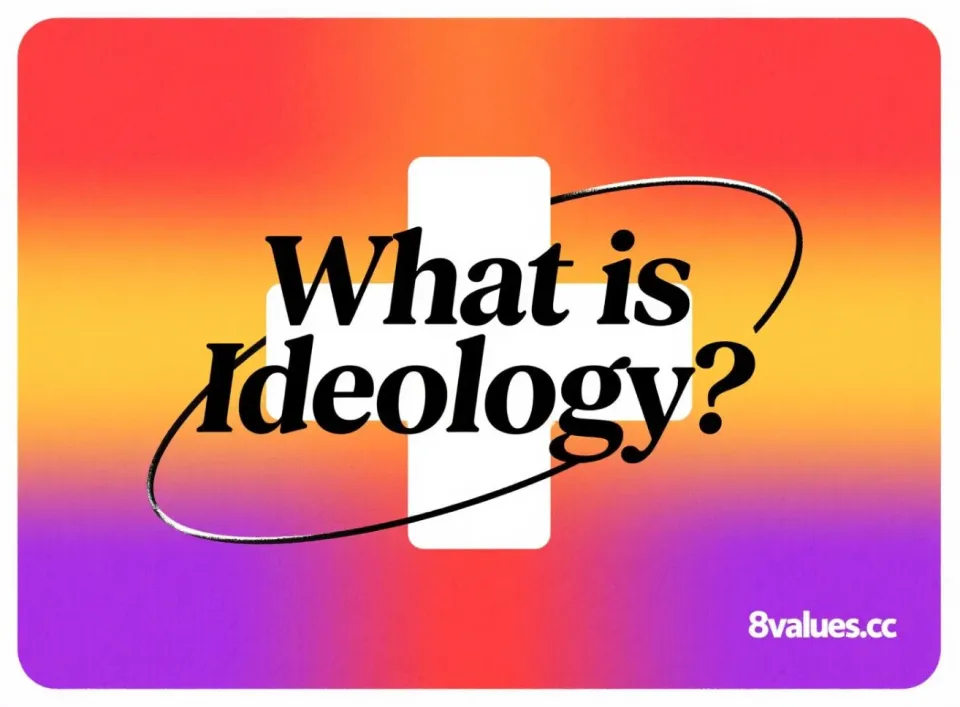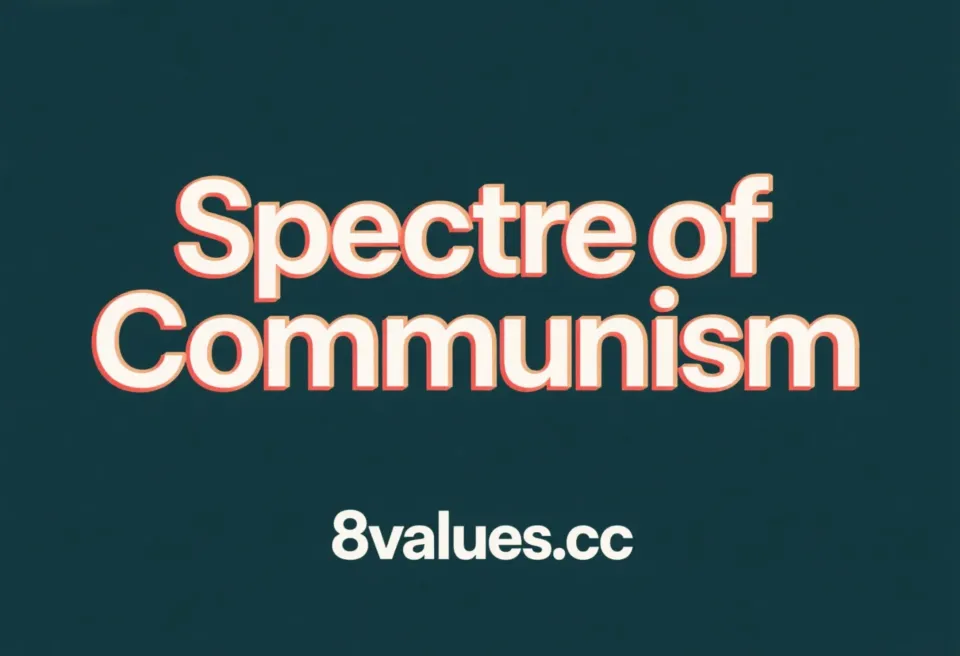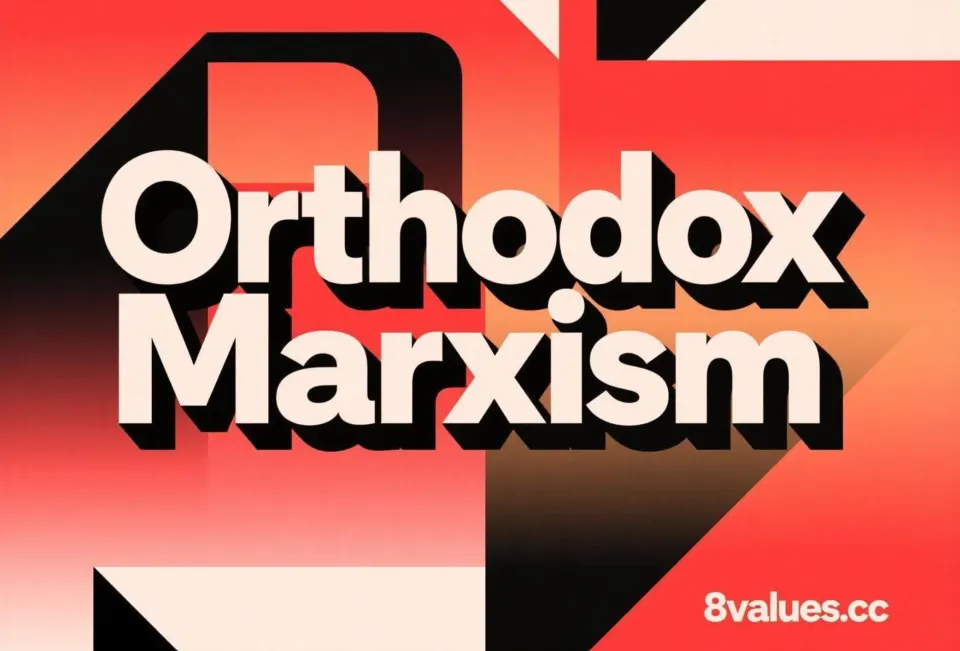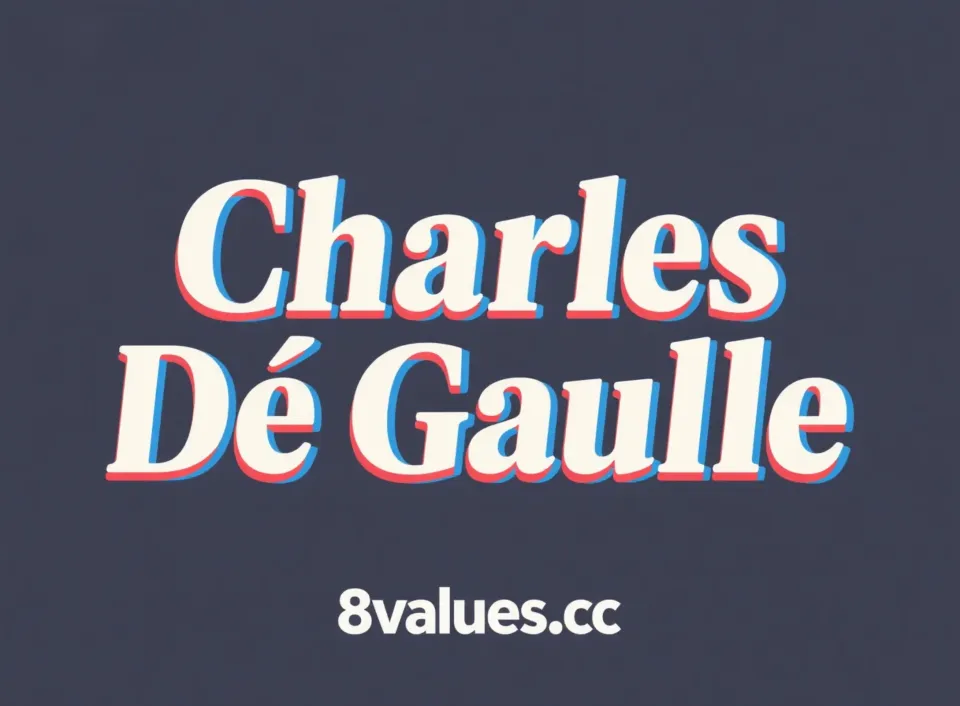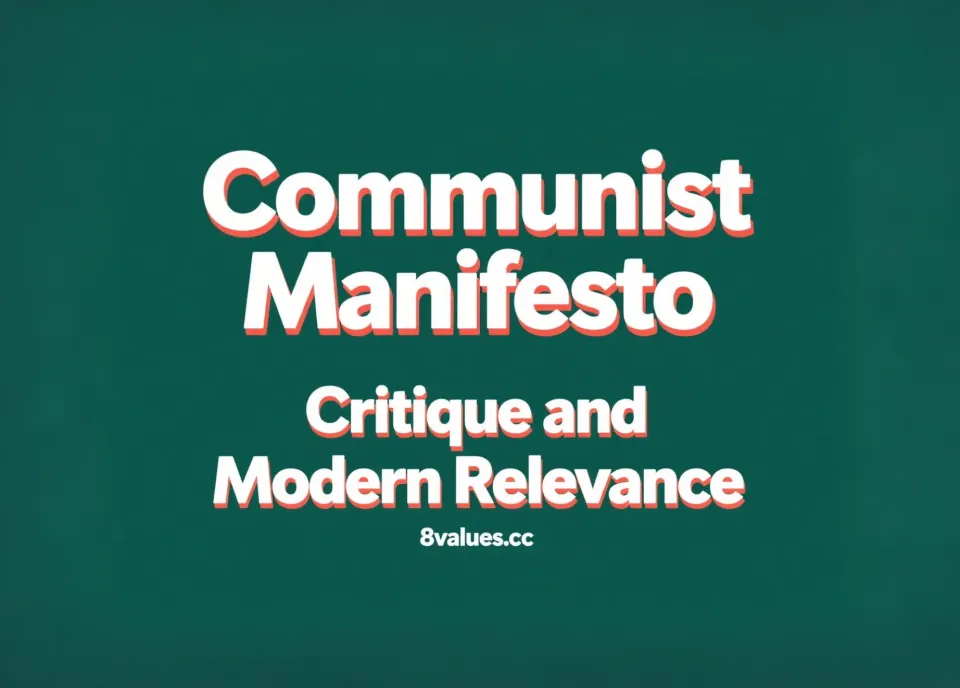Left-Wing Populism | 8values Interpretation of ideological ideology in political tests
This article will explain in detail the core concepts, economic and social policies, historical evolution, global cases, theoretical foundations, deep logic and global influence of the "left-wing populist" ideology in the 8 values political values test, helping you fully understand this complex and diverse political phenomenon.
In today's complex and changing global political landscape, various political positions and ideologies are intertwined and collided. If you have explored your political tendencies through the 8values political test , you may encounter the result of "left populism". It is not a simple label, but a complex ideology that combines specific political propositions, social sentiments, and mobilization strategies. This article provides you with an in-depth interpretation of left-wing populism, helping you better understand this political phenomenon that is increasingly attracting attention in the contemporary world, and to think about its place in the global political spectrum and its impact.
Left-wing populism: Definition and core philosophy
Left-wing populism, also known as Social Populism, is a political philosophy that combines left-wing political stance, populist rhetoric and themes. It is often defined as a set of political philosophy that rejects existing political consensus and integrates anti-labi-faire and anti-eliteism.
The core concepts of left-wing populism include:
- Anti-eliteism : Left populism strongly criticizes and opposes the current political and economic elites, who believe they have exploited the interests of the lower classes. Elites are often portrayed as corrupt and selfish, while people are seen as forces of moral goodness. For the left, elites refer more to business elites and large enterprises.
- Representing the interests of civilians : It claims to represent the interests of the vast majority of the lower classes and uses this as a call to call on supporters to participate in political movements. His words often include anti-establishment, opposition to the establishment, and speaking out for the "ordinary people".
- Social justice and equality : Emphasize social justice and equality, often opposing inequality in the elite and capitalist systems. Its core topics include social welfare, improving working conditions and reducing income inequality.
- Anti-capitalism and anti-globalization : Critical about global capitalism and its negative impact on ordinary citizens, advocating economic democracy and alternative globalization.
- Anti-warism : Take an opposition to military operations, especially those related to U.S. military operations.
- Equality : Believe in the principle of being created equal to all people and support the rights of minorities.
Unlike National Populism, the left-wing populism is mainly directed at capitalists and economic elites, while right-wing populism attacks more on immigrants, minorities or specific political figures. Left populism tends to be an inclusive understanding of the "people", while right populism may define the "people" based on "attribute characteristics" such as race, ethnicity, or religion, which is exclusive.
The historical roots and evolution of left-wing populism
The names of left and right were originally derived from the French Revolution at the end of the 18th century. At that time, radical revolutionaries sat on the left side of the parliament and advocated the removal of old ideology and system, thereby establishing new ideology and system. Those who supported laissez-faire capitalism were also regarded as left at the time, although this position was regarded as right in most modern Western countries.
During the American Progressive Period from the late 19th century to the early 20th century, many pro-peasant and workers populist parties emerged, such as the People's Party. They opposed the pro-big enterprise policies of the Trust and the Republican Party, advocated the protection of farmers' interests, and government control monopoly.
Since the early 1980s, the neoliberal economic policies widely implemented by European and American countries have led to a profound transformation in capitalist society and formed a neoliberal hegemonic order. The new oppression and new domination brought about by this order continue to arouse new democratic demands and resistance movements. Chantal Mouffe believes that the biggest change brought about by the neoliberal hegemony order is the emergence of "post-democracy", that is, the state system is still a liberal democracy in form, but in essence, it is severely lacking in democracy, and equality and popular sovereignty have been severely weakened. At the same time, as the regulatory power of the financial system in the process of globalization compresses the economic policy space of the nation-state government and the "cartelization" phenomenon of the party system, the "post-political" state, that is, the political boundaries of the left and right wings are blurred, and traditional left wing parties are increasingly converging with the neoliberal right wing parties.
This "post-democracy" and "post-political" situation makes it impossible for the middle and lower-class people to effectively express their demands through traditional political parties, which in turn causes dissatisfaction with the existing system. Neoliberal globalization has exacerbated economic insecurity and cultural anxiety, providing fertile soil for the rise of left-wing populism. The global financial crisis of 2007-2009 fully exposed the fundamental flaws of the neoliberal hegemony order, and the people's calls for change are increasing. This is called a "populist moment" by Murphy, providing opportunities for reintegrating the people's strength and building a new collective action subject - the "people".
Left-wing populist economic and social policy propositions
Left populism has a distinct set of arguments in economic and social policy, aiming to address social inequality and economic injustice.
In terms of economic policy :
- Wealth redistribution : Advocate economic equality through tax reform and wealth redistribution, which may include measures such as raising the minimum wage standard, expanding social welfare projects and increasing public investment. This is in line with the political system of high taxation, high welfare, and high government intervention and regulation in the traditional socialist concept.
- Trade protectionism : It tends to protect domestic industries and employment, opposes competitive pressures brought by free trade and globalization, and may adopt trade protectionist policies and measures to restrict foreign investment.
- Anti-capitalism and anti-globalization : Criticism of the capitalist system and the current globalization model, and advocates economic democracy and alternative globalization.
- Government intervention in the economy : Identify the big government and support the government to strongly interfere in the economy.
In terms of social policy :
- Social justice and equality : Focus on the protection of educational equity, gender equality and the rights and interests of minorities, and advocate diversified social inclusion. In Latin America, for example, left-wing populism helps to incorporate previously excluded or marginalized groups (such as ethnic minorities, indigenous peoples) into the political system, making them more inclusive.
- Anti-warism : There has been an increase in anti-warism in the left-wing populist movement, which is related to criticism of US military operations, especially military operations in the Middle East.
These policy propositions reflect left-wing populists’ concerns about the bottom of society and their determination to correct inequality through political means.
Political mobilization, mass base and international perspective of left-wing populism
The political influence of left-wing populism is inseparable from its unique mobilization methods, a specific mass base and an evolving international perspective.
In terms of political mobilization :
- Call for social justice and reform : Left populists often attract supporters by calling for social justice and reform, emphasizing the unity and common interests of the ordinary people.
- "Enemy-turned" elite narrative : They are good at using insecurity narratives to construct elites as threats to the people, making them lose their legitimacy. This "enemy" narrative is usually unfolded in three ways:
- Threat Narrative : A distinctly defined elites as existential threats to citizens, emphasizing dangers, risks and threats. For example, the French "Indomitable France" party accused Macron and his party of a threat to the French economy.
- Instability narrative : portraying elites as causes of social instability, emphasizing uncertainty and instability. For example, Macron is defined as "disordered president", embodying "liberal economic instability and social disorder".
- Failure to protect narrative : stressing that people need to be protected from danger, but the elite fail to achieve this protection and even intentionally create insecurity. For example, "Indomitable France" condemns the government's failure to avoid environmental pollution and protect citizens' health.
- Charming leadership : Populist parties and movements are often led by charisma leaders who shape themselves into spokespersons for the people.
Its mass base mainly comes from the middle and lower classes of society, especially those who are economically disadvantaged. This insecurity and loss of confidence in existing leadership and institutions provide conditions for the breeding of populism.
In terms of international perspective :
- Openness and Internationalization : Left populism usually has a more open and international perspective and is willing to work with other countries to solve global problems such as climate change and poverty.
- Anti-imperialism and anti-colonialism : In terms of external strategies, they may use imperialism, colonialism, and globalization as the targets of struggle.
- Criticism of supranational institutions : Some left-wing populists advocate Europeanism, strongly criticize European institutions and call for reform. For example, France's Jean-Luc Melanchon and his party called EU leaders "tyrants" and EU "dictatorship", emphasizing the economic, social, political and military threats it poses. They may also advocate withdrawal from the EU or NATO to defend and restore national sovereignty.
- Nationalist color : Some scholars have also pointed out that the left-wing populist movement may exhibit nationalistic characteristics, such as the Kemalism in Turkey or the Bolivarian Revolution in Venezuela. But they are usually less nationalistic than other populists.
Overall, left-wing populism is more likely to seek consensus and compromise in international affairs, but may also be skeptical about international cooperation and multilateral mechanisms.
Outstanding Representatives of Left-wing Populism and Global Influence
Left populism has its representative figures and practical cases all over the world, and its forms and propositions vary by region and era background.
In Latin America , left-wing populism has a long and complex history and is regarded as a landmark political phenomenon in the region. Its representative figures and cases include:
- Hugo Chávez and his unified socialist party in Venezuela : Chavez is regarded as an outstanding representative of left-wing populism in Latin America. He entered politics as an outsider and changed the two-party system of Venezuela, and held power until his death. He put forward the slogan of building "Socialism in the 21st Century", firmly opposes American hegemony, and promotes social change through measures such as nationalization, education for all, and reform of political institutions.
- Bolivia's Movement for Socialism led by Evo Morales : The party has been in power since 2006 and initially developed from the Coca Growers Rights Protection Movement.
- Rafael Correa 's Sovereign Motherlands Movement : The party has been the ruling party in Ecuador since 2007, advocating strengthening economic, social and environmental coordination and balance, and safeguarding national independence and sovereignty.
- The Argentina Victory Front led by Néstor Kirchner and Cristina Fernández de Kirchner : The party belongs to the left-wing Peronism, advocates independent foreign policy, opposes the Washington consensus, and implements government intervention in economic and trade protectionism.
In Europe , with the 2008 financial crisis and the failure of neoliberal policies, a new wave of left-wing populist parties and movements emerged:
- Greece Radical Left Alliance (Syriza) : Rising during the Greek national debt crisis, opposing fiscal austerity policies, and came to power in 2015.
- The Spanish Podemos : The political movement that emerged in 2014 against austerity has achieved remarkable results in the European Parliamentary elections and the Spanish general elections.
- France "La France Insoumise" : formed by former Socialist Party member Jean-Luc Mélenchon, advocated the establishment of the Sixth Republic of France, expanded the people's political rights, and increased the minimum wage and social welfare.
- The movement of former British Labor leader Jeremy Corbyn : seen as a democratic socialist and a left-wing populist, his position is similar to Sanders.
- Socialist Party : In 1991, the Communist Party platform was abolished and transformed into a left-wing populist party, opposing the EU.
- Die Linke : It was formed by the merger of the Democratic Socialist Party with Labor and Social Justice-Election Substitution. Its famous member Sahra Wagenknecht established a new "Sarah Wagenknecht Alliance" in early 2024, advocating "Left-wing populism with conservative colors."
Cases from other countries and regions :
- United States : Bernie Sanders and Elizabeth Warren showed left-wing populist character in the 2016 and 2020 presidential elections. The Occupy Wall Street movement and its idea of "We are 99%" are also seen as a manifestation of left-wing populism.
- South Korea : After Moon Jae-in was elected president in 2017, he implemented left-wing populist economic policies such as significantly increasing social welfare expenditures and minimum wages.
- Japan : The "Reiwa Xinxuan Group" led by Taro Yamamoto is an anti-establishment left-wing party, advocating the abolition of consumption tax, raising the minimum hourly wage, and free education in universities.
These cases show the diverse manifestations of left-wing populism in different contexts, reflecting its dissatisfaction with the existing political and economic order and its shared desire to seek change.
Theoretical basis and critical reflection of left-wing populism
Left-wing populism is not just a collection of policy propositions. It has a deep theoretical foundation and also faces severe criticism and challenges from all parties.
Laclau and Murphy's theoretical framework
Argentine scholar Ernesto Laclau and British political theorist Chantal Mouffe are the founders of left-wing populist theory. Their theory was proposed in the context of the social and economic turmoil in the late 1970s.
- Populism is a political logic rather than an ideology : they believe that populism is not a single, comprehensive ideology, but a "thin-centred ideology", that is, it does not itself deal with the best form of the economy or political system, but is combined with other "main ideology" (such as socialism, nativism). Populism is a political strategy or practice that gains and maintains power by interpreting social conflict as a struggle between “pure people” and “corrupt elites.”
- Hegemonic Formation : Murphy and Laclau believe that in the "post-political" era, the left should compete for a hegemonic position that can dominate everything and expand the democratic foundation. Hegemony operation refers to certain specific and special elements that play a role in constructing universality.
- Empty Signifier : They pointed out that concepts such as "freedom", "justice", and "people" have no clear meaning in their background, and are the "empty signifier" floating in the daily pragmatic domain. These empty words must be bound by the "rigid performance pointer" in order to be given specific meaning. The construction of the people is to give this "absence of integrity" to name it. This ambiguity is a fundamental feature of political logic and reflects the ambiguity and uncertainty of social reality.
- Antagonism : Murphy accepted Carl Schmitt's view that politics is "a difference between us and us", but revised it. She emphasized that confrontation in political life is inevitable and cannot be completely eliminated, but the "enemy" should be transformed into "opponents" and the life-and-death opposition should be transformed into "agonism" that recognizes the legitimacy of the opponent. The goal of left-wing populism is not to eliminate opponents, but to activate democracy through a victorious political model.
- "Declassification" proposition : Laclau and Murphy broke the Althusserian Marxist tradition and no longer gave the working class a privileged role in social transformation, but emphasized the heterogeneous hegemonic connections that politically demanded. They argue that populism makes the left think about other identities outside of the class and does not place identities at specific positions determined by relationships with the means of production.
Main criticism and challenges
Although Laclau and Murphy's theories provide a new perspective for understanding populism, left-wing populism also faces multiple criticisms and challenges:
- Variants of reformism : Criticism points out that left-wing populism is actually just a modern variant of social democracy (i.e., bourgeois reformism). It attempts to balance traditional social democratic reformism with the revolutionary left, but its essence is still difficult to get rid of the rut of reformism.
- Class Absence and Misreading of the Working Class : Critics believe that the core problem of left-wing populism lies in "class Absence". It denies the importance of social class, categorises it into one of several general sociological categories. This analysis misreads Marx's analysis of class, narrowly defining the working class as a manual laborer, not all those who make a living by hiring labor and do not own means of production. By narrowing down the scope of the working class, left-wing populism created the “people” that must occupy its space, but the category of “people” obscures class distinction.
- Lack of internal democracy and leader worship : Some left-wing populist movements, such as France's "Indomitable France", have been criticized for lack of internal democracy, and most of the decision-making power is in the hands of the core circle, and the personal leadership of the leader becomes the core. This may make it similar to Bonapartism, where ideology communicates directly with the “people” as an indiscriminate masses, thus focusing on a leader who can embody this “consensus.”
- Potential threat to democracy : Although left-wing populism is not apparently inconsistent with democracy, if its leaders have enough power, it may also go to an authoritarian government, excluding groups that are not considered part of the “people”, as the development of the Chavez government in Venezuela shows.
- Formalism and the grand narrative of neglect : Critics believe that Laclau's theory is too formalistic, and that its interpretation of the vacuolar symbol does not fully take into account its historical continuity. The denial of "grand narrative" ignores Marxism's profound understanding of capitalism and class society.
- Catering to xenophobia and nationalism : Although left-wing populism is intended to be inclusive, some critics point to it that it may cater to xenophobia and nationalism in practice. For example, Melanxun’s position on immigration has been accused of catering to far-right rhetoric.
- Ignoring institutional factors : Laclau's theory has been criticized to downplay the role of the state, political parties, trade unions and other systems in historical change and continuation.
In short, left-wing populism attempts to open up new paths between traditional left and liberal democracy, but its inherent limitations in theory and practice put it at risk of repeating the mistakes of reformism and posing a potential threat to democracy.
The rhetoric and linguistic strategy of left-wing populism
An analysis of left-wing populism should not only focus on its policy propositions, but also delve into the rhetorical and linguistic strategies it adopts in political texts and speeches. These strategies are designed to shape reality, gather supporters and weaken criticism.
An empirical study of speeches by the Spanish-Language leader in the Spanish-Language Department through Natural Language Processing (NLP) tools reveals the following language characteristics:
- Ingroup virtues and emotional content : In the speech of left-wing populism, the content that emphasizes the virtues and values of internal groups (such as "people" and "country") is more prominent, and is accompanied by a strong emotional language. This strategy aims to enhance the sense of identity among internal groups by emphasizing common interests and values. For example, Nicholas Maduro repeatedly emphasized trust in the “Venezuelan people” in a 2019 speech to build a common future.
- Simplified language and directness : Populist styles are often simple and direct, aiming to convey to voters that leaders and their parties belong to the “people”. This may include the use of metaphor, indecent words, and insults to opponents.
- Use of Future Tenses : Research has found that future tenses are used more frequently in left-wing populist speeches. This can be understood as a strategy to manipulate the audience by bringing future events closer to the current scenario, thereby increasing the authenticity and importance of future events. For example, in a 2002 speech, Argentine leader Duald portrayed a promising future with “Low we will see the results”.
- Conditional Connection : The use of conditional Connection (such as “if”, “as long as”) is significantly positively correlated with the populist score. These connections make the information appear more credible by setting conditional reality, thereby enhancing the persuasiveness of the argument.
- Complexity of first-person use : Although the use of first-person (“I” or “we”) is generally believed to be a distinctive feature of populist leaders, the findings challenge this traditional view. In left-wing populist speeches, there was no significant positive correlation between first-person use and populist scores.
- Positive effects of third-person use : On the contrary, the use of third-person (such as “people,” “country,” “they”) has a positive and significant impact on populist scores. This could be a strategy that aims to hide the responsibility of the actors, focus on the action itself, or blame the responsibility on non-specific entities, thereby circumventing the responsibility of the leader themselves. For example, in his 2006 speech, Morales of Bolivia mentioned that “it is the democratic mission of the Bolivian people” and attributes the democratic vision to the “people” rather than the individual.
Together, these linguistic and rhetorical strategies form the core of left-wing populist discourse, aiming to achieve their political goals through strong identity effects, weaken the critical supervision of the audience and consolidate the leader’s preset vision. The nature of this strategic use of language also confirms the characteristics of populism as a means of political manipulation.
Conclusion: Understanding complex and changeable political phenomena
Through the 8values political test , we can have a preliminary understanding of the ideological result of "left populism", but to truly understand it, we need to delve into its diverse definitions, historical trajectories, policy propositions, mobilization strategies and theoretical critiques. As a "thin" ideology, left-wing populism can be combined with "heavy" ideology such as socialism and nationalism to form a narrative of the struggle between "pure people" and "corrupt elites". It has significant practices around the world, from the Bolivarian Revolution in Latin America to the New Left movement in Europe, showing a strong pursuit of social justice, economic equality and popular sovereignty.
However, left-wing populism also faces many challenges and criticisms, including being seen as a variant of reformism, neglecting class analysis, potential authoritarian tendencies, and manipulativeness in its linguistic strategies. Whether from the perspective of theoretical construction or practical influence, left-wing populism is a complex and evolving political phenomenon.
It is crucial to maintain critical thinking when evaluating any political ideology. The emergence of left-wing populism reflects dissatisfaction with the existing political and economic order and the public's need for a more inclusive and fair social structure. Understanding its internal logic and potential risks will help us better navigate the political trends in the contemporary world. Hopefully this article provides you with a comprehensive and in-depth perspective that helps you better understand the “left populism” in the 8values political test results and its complex role in shaping the global future.
For more exciting content, please continue reading the 8Values blog post !
